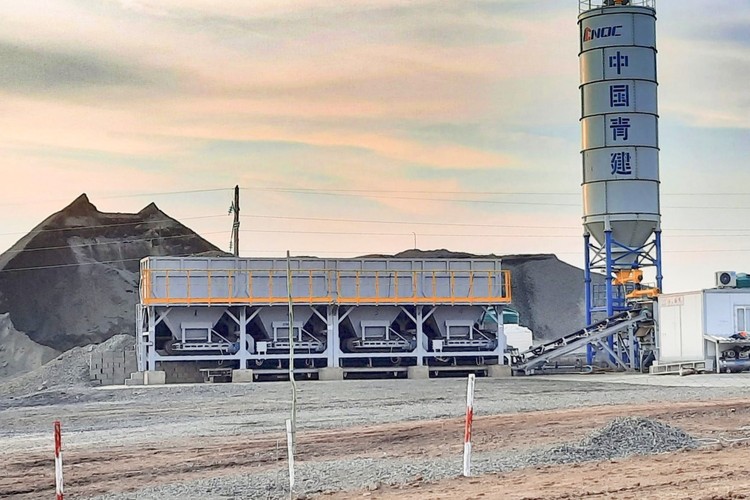
12 November 2025
A Qingjian Group Company plant in Qacha’s Nek during construction of the Makhaola Lerotholi Highway. Photo: Sechaba Mokhethi
A road project meant to transform Qacha’s Nek has instead left residents struggling with cracked houses, flooded fields, unpaid wages and broken promises, according to a parliamentary report tabled on Monday.
The Makhaola Lerotholi Highway officially opened in 2024. It was built by Chinese contractor Qingjian Group Company with a M1.9-billion (M1 = R1) concessional loan from the Chinese government.
The 91km stretch from Ha Mpiti to Sehlabathebe was celebrated as a major development milestone. It employed 1,548 Basotho, including 1,331 local people, and sparked small businesses selling food and fruits to road workers.
But findings by the Portfolio Committee on Natural Resources, Tourism and Land Cluster, presented in Parliament this week, revealed that the project caused destruction and hardship for communities along the route.
A road has been constructed from Mpiti (aka Mpite) to Sehlabathebe. Google Maps currently gives the distance as 109km and taking nearly four hours. Satellite image from Google Maps
In May, the committee launched public hearings in 23 villages affected by the project after receiving petitions from residents complaining about damage caused during the road construction.
The report found “systemic failings” in how the project was managed and monitored.
A key problem was poorly conducted environmental assessments, which meant many genuinely affected residents were never counted, delaying their compensation.
The report also found corruption – that “some chiefs affirmed that certain members were affected by the project and therefore eligible for compensation, even though they were not impacted”.
“This has resulted in compensation being disbursed to individuals who were not affected … while legitimate claimants face delays.”
Oversight weaknesses were compounded by poor co-ordination between the affected villages, the contractor, and the Ministry of Public Works and Transport. The committee criticised a decision to assign only one person to manage co-ordination, saying it resulted in a “failure to adequately address complaints”.
The villagers told the committee their homes cracked due to blasting and that rainwater runoff from the road damaged their houses. Some were forced to rent elsewhere because their houses became unsafe.
Farmers said they could not plough their fields during the rainy season because the contractor failed to dig drainage ditches, leaving the land waterlogged and littered with rocks that have never been removed.
Fences near the road were destroyed and not repaired. Footpaths linking villages to schools were closed or left obstructed, making it hard for children and teachers to reach classrooms.
The contractor also left unrehabilitated quarry pits, where livestock later fell.
Some employees claimed they had not been paid for work done.
Tragedy also struck. A child was killed in a truck accident. Insurance compensated the family with M31,770.
Two children were also injured, one had an eye damaged by explosives, the other had their foot cut by an excavator. Their compensation cases are still pending.
The Ministry of Public Works and Transport admitted that 21 villages were “unavoidably impacted” by the construction of the Mpiti to Sehlabathebe road. Out of 149 complaints over damaged fields and assets, 95 cases were resolved while 36 remain outstanding. The ministry also reported that 178 blast-related complaints were resolved.
The ministry pledged to compensate unpaid claimants by the end of the 2025/26 fiscal year and to mediate between unpaid employees and subcontractors.
In the report, the Qingjian Group defended its record, rejecting eight claims about damaged fields and fences, saying they fell outside the road reserve or that no visible damage was found. It also rejected ten blast-damage claims, arguing that some residents refused its subcontractors permission to repair houses, “opting instead for new houses”, while others hired subcontractors without authorisation and later sought reimbursement.
But the committee said the company had failed to honour an agreement with the community and the Roads Directorate to build village roads and playgrounds as part of its social responsibility commitments.
The Qingjian Group says it is committed to repairing 17 remaining houses damaged by blasting, and to carrying out long-overdue corporate social responsibility projects, including rehabilitating village roads, playgrounds and building a toilet for the village chief.
The parliamentary report concludes that while the highway has improved access to Qacha’s Nek, it also “left deep scars among the people it was meant to uplift.”
The committee urged tighter oversight of foreign-funded infrastructure projects to ensure that future development “does not come at the cost of local livelihoods”.